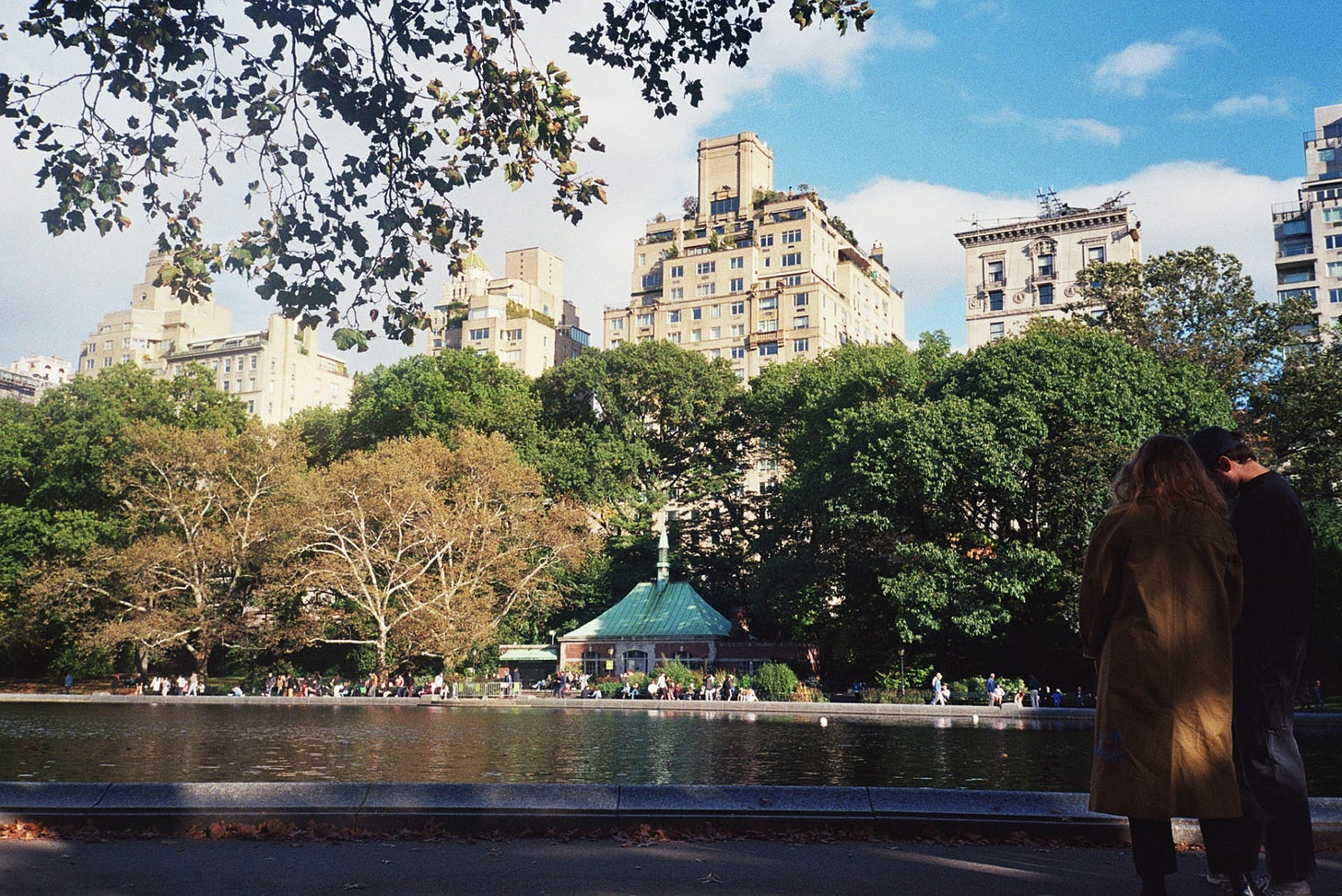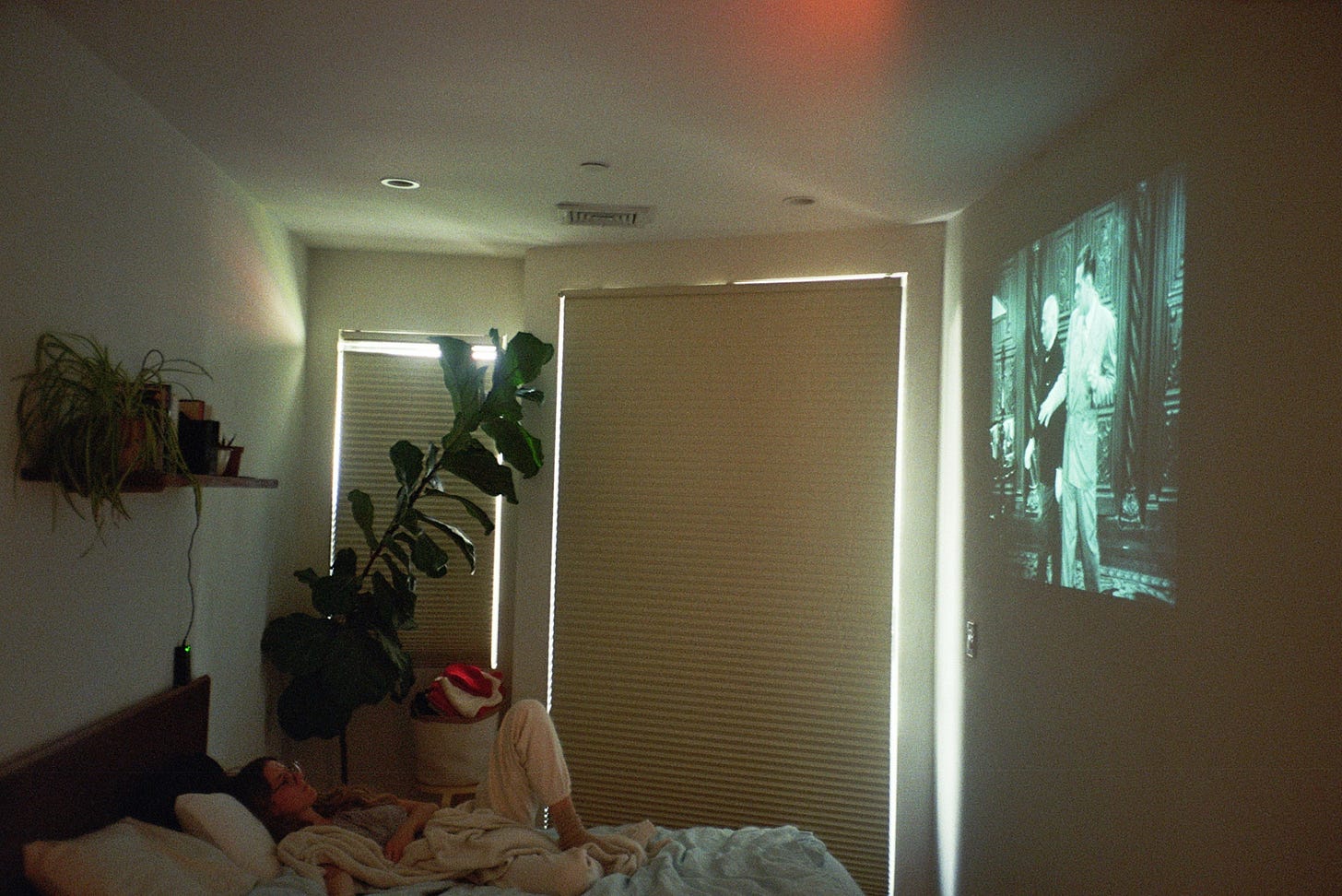Maybe Baby is a free Sunday newsletter. If you love it, consider supporting it financially. For $5/mo, you’ll gain access to my weekly recommendations, my monthly Q&A column, & my weekly podcast. Maybe Baby is reader-supported, hence the lack of ads and sponsors. Thank you!
Good morning!
On my walk to get a coffee the other day I watched a group of four-year-olds cross Throop Avenue. They were wearing matching t-shirts and tiny jackets and holding onto a long rope strung between two women. I watched them inch tidily along the crosswalk like ducklings and felt my eyebrows drip sentimentally down the sides of my face. The morning was bright and cold. The sight of them was sweet on the level of painful, like a good memory that makes you want to cry. Their experience seemed very far away from mine, and I wasn’t wistful so much as awestruck—at how sprawling and disorienting life could feel sometimes. They were perfect. I was grown up. Briefly, we intersected.
Fall always makes me feel like this, a little nostalgic and spellbound, and also melancholy, as in the good way. I’ve always appreciated that in New York the temperature drops quickly (once it does), and suddenly the city seems tuned to a different frequency. Everything’s crispy and in focus, the familiar rendered in detail, like when you put glasses on and can finally see the individual leaves on the trees. The imprint of school persists: There is the sense of starting over in the fall. Of picking out the right outfit for your first day, of the implied promise that you can become something new within a framework you recognize. Still you, same friends, but dialed in. Fall is a transition between extremes, a return, a resting place, a kind of stability. It’s a lot of things. My affection for it always feels trite, and I suspect that’s the point.
Loving fall is basic in every sense, which I accept fully, but I know it’s not a given. Anne Helen Peterson recently wrote about a phenomenon she calls “fall regression,” whereby this time of year invites a sense of failure: “The calendar moves forward but we’re stuck. In old patterns, in old understandings of how work and our families and the world should be.” I didn’t resonate with this in the slightest. As I read, I felt almost defensive on fall’s behalf, which probably means I should get offline. The discrepancy makes sense though: Peterson is a self-proclaimed “summer person.” “It’s when I feel most like myself,” she writes. As someone who feels most “like herself” in the fall, and who has at points considered this a personality trait (being 19 is a plague), I started wondering what we even mean by this phrase. Is it possible that weather alone could switch on more authentic versions of ourselves, or do we mean something else entirely?
I ask because the idea that we sometimes feel like ourselves and sometimes don’t is both widely accepted as coherent and in conflict with reality, which says that we are always ourselves, by definition. Even when we are being inauthentic, we are expressing something true about ourselves: inauthenticity. Does that make you feel crazy? I’ve struggled to grasp this concept for basically my entire life: That my personality is not the rule, but every exception and rule combined into one chaotic knot. Fall or summer, sweet or cranky, generous or selfish, I remain (begrudgingly) myself. And yet I still think this all the time: I feel like myself / I don’t feel like myself. Perhaps what I really mean is: I understand myself / I don’t understand myself. Which reminds me, apologies in advance, of something I wrote in my journal in 2013:
“Maybe this is all just a defense mechanism. Maybe ‘not feeling like myself’ is just code for ‘I’m sad and thinking too much about it.’ Maybe by defining sadness and discomfort as ‘not feeling like myself’ I’m separating myself from it.”
You know what makes me feel like myself? Writing around the same question for eight years, unfortunately. To that end: I disagree with my former diagnosis. I don’t think “not feeling like myself” has to do with being sad necessarily, I suspect it has more to do with comfort and control. I feel like myself when I recognize the terms of my existence and feel comfortable navigating myself within them. I feel like myself when I recognize myself: the people I love, the things I like, the way I act in certain situations. I assume this filter will bias me towards more positive versions of me, but I don’t think it has to. There are plenty of toxic habits that make me feel like myself: self-criticism, self-delusion, cynicism. Like the Fruedian notion that we gravitate towards the familiar, I’m drawn to my thought patterns with the deepest grooves. Automatisme de repetition: “the tendency to unconsciously seek out the pains of the past, like a machine stuck in a feedback loop.”
Anne Helen Peterson, who I do not know, says that summer makes her feel like herself “in part because it provides daily invitations to a world outside of work.” Since the weather started turning, she’s felt herself “slipping”: eating snacks instead of meals, faltering on her hobbies, working too much. All this “manifested as a blob of amorphous unease.” By contrast, the change in weather has made me feel more firmly like myself: I am enjoying getting dressed, my favorite music is hitting, I am in the mood to read and think. Presumably these quotidien details comprise our senses of selves (or lack thereof). I approve of my current desires, therefore comprehend myself. She feels the opposite in every respect.
Last week, out of curiosity (and suspicion), I asked my Instagram followers if they too “feel like themselves” in the fall. Over 7,000 people responded and 76% of them said yes. When I asked them to interpret their answers, I received more than 1,500 impassioned replies, mostly from people with big decorative gourd energy. Nearly all of their comments fit nicely into four themes: 1. Summer presents too much prescriptive pressure around happiness and socializing. 2. Fall reminds people of going back to school and feels like a fresh start. 3. The cooler weather makes people feel more confident in their bodies and clothes. 4. The cozy routines of the season are familiar and nostalgic. From those who answered no: Seasonal Affective Disorder, mostly; fear of winter isolation—it all makes sense. Some of my favorite replies defied these categories:
-"I’M CONSTANTLY IN FLUX AND FEEL IN TUNE WITH NATURE WHEN IT IS, TOO.”
-“My sister is a cloudless summer 80 degrees 2pm afternoon. I’m a crisp fall drizzly 9pm night.”
-“‘Autumn in New York brings the promise of new love’ -Billy Holiday”
-“As Rhoda Morgenstern once said, I ‘keep better’ in cooler weather.”
-“Every city has a season when it’s at its peak: NYC’s is fall.”
Someone shared this poem by Dorothea Grossman, which I love:
I have to tell you,
there are times when
the sun strikes me
like a gong,
and I remember everything,
even your ears.
(I imagine this moment on a clear fall day, when memories are most likely to strike me like a gong. In my mind, even the ears are cold, a little red. Do you imagine it in the summer? Maybe this poem is a litmus test for seasonal association.)
I assume my data is skewed. Are people who follow me more likely to love sweaters/soup? It seems possible, on a vibe level, although I can’t substantiate it. Either way I wouldn’t be surprised if affection for fall is slightly more common than antipathy for it. Nor would I be surprised if more people “feel like themselves” around this time of year than other times. This whole conversation is a bit constrained geographically, but at least in the US, the last four months of the year are steeped in tradition. And I think we’re quite starved for that sort of thing—for rituals and customs, for cultural pillars around which to commune. This time is familiar; it has deep grooves. I’m not only talking about holidays, but the scope-narrowing implied by the cold: warm gatherings, turning inward, a slower pace of life. Obviously not everyone has positive feelings about this time, but it makes sense to me that many people feel stabilized, existentially, by a season ripe with ceremony, particularly during an era best defined by nihilism.
Ultimately we are always ourselves, even during our least favorite season, maybe especially then. It strikes me as important to stress-test our self-conception—to feel ourselves regress, occasionally, or digress, and to recognize our selfhood still. Since I moved away from warm California, I’ve looked forward to the changing seasons for their ability to jumpstart this process, but it will happen either way, and does all the time. I feel “like myself” one week and don’t the next. I comprehend myself and then I don’t. Maybe we’re bound to this mercuriality forever, or maybe, through the very repetition of this process, we move slowly towards a more expansive sense of self.
Pick of the week: “Toward a Just Food System,” a fascinating piece by Jan Dutkiewicz and Gabriel N. Rosenberg for Dissent about why the call for a return to small, local “natural” farming as a solution to global food issues is out of step with modern-day needs (and a little too nostalgic). “The upshot of that realization is that we need not be confined by cramped and nostalgic agrarian definitions of what real food and farming are. We are free to reinvent them both, and we invariably will.”
Runner-up: Smitten Kitchen’s sheet pan chow mein, which I loved.
Pic of the week: Watching a movie on the projector I impulse-bought after seeing a TikTok. I’ve never been a TV-in-bed person but maybe I can be convinced…
Thanks for reading!
Haley
This month a portion of subscriber proceeds will be redistributed to Make the Road New York, the largest progressive grassroots immigrant-led organization in New York state, focusing on issues like education, housing, immigration, policing, and labor justice.
Give me feedback • Subscribe • Request a free subscription • Ask Dear Baby a question







